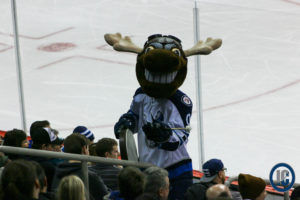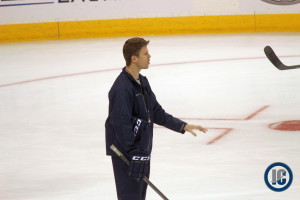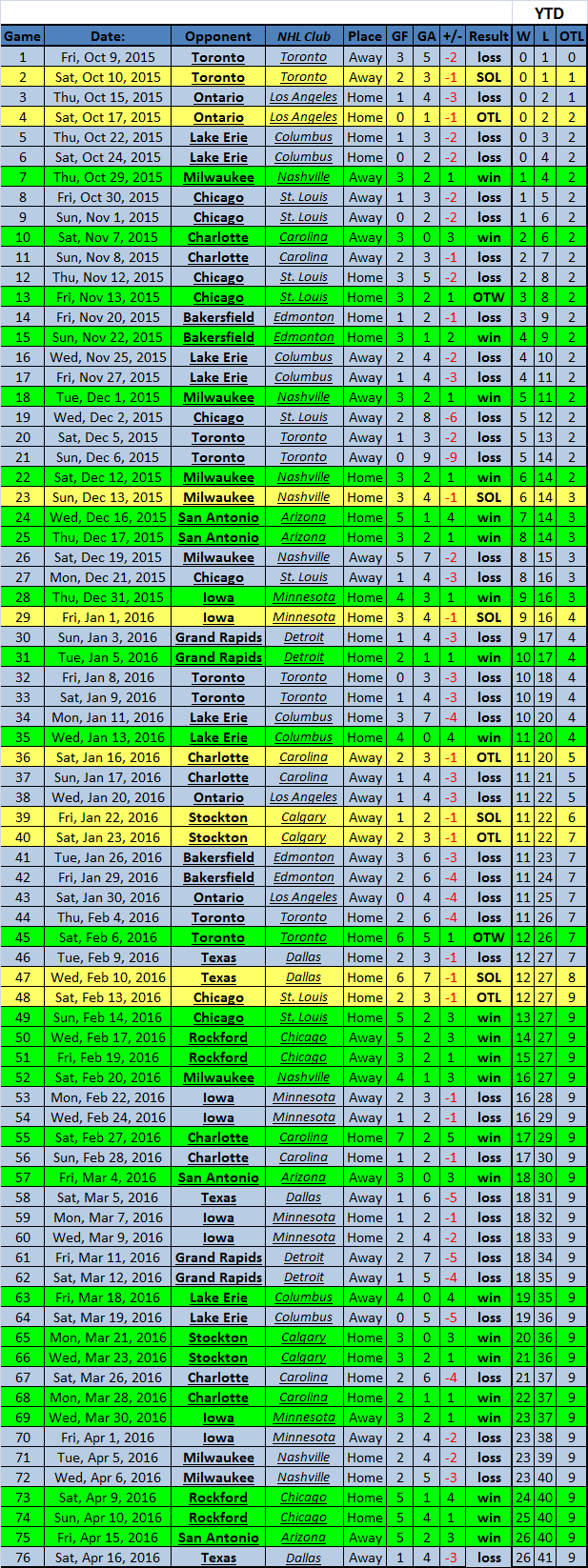We begin a look back at the inaugural Manitoba Moose season with a look at the fan experience inside the MTS Centre as well as a thought on former Moose coach Keith McCambridge. We being an in-depth look at the players (forwards, defenceman and goalies) who played for this team in the next part of our Moose Year End Review.
(1) Night at the Mooseum

After five years away, the Moose made their on-ice return to Winnipeg on October 15, 2015, in front of a boisterous crowd of 8,812 – a sold out lower-bowl at the MTS Centre. This was one of 36 games I attended this season, and taking the elevator up to the 5th level that night, a familiar pattern started to emerge. First, warmth and friendliness from the MTS Centre staff as you get off the elevator. Next, walking down the hallway, you start to appreciate the growing sense of history, as you pass dozens of pictures hung on the wall – draft photos of 1st rounders like Mark Scheifele, Nikolaj Ehlers, and Kyle Connor, and pictures of landmark events, like the announcement of the Jets’ return to Winnipeg in the spring of 2011, the first regular season Jets game in October, 2011, and the first playoff game, in April, 2015. Breezing past the corner office, where Jets management watch the play, you then pass hockey’s bean counters – True North staff, which keep track of all the little stats which today we call “analytics”. Continuing on down the hall, you pass the Moose radio broadcast, which is led by a consummate professional in Mitch Peacock, aided by entertaining radio personality, Jim Toth, or former NHLer Trevor Kidd.
Following the national anthem(s), a fantastic entertainment experience begins. The off-ice production of Moose games is a huge success in so many ways. The main reason for that is simple: youthful enthusiasm. There are so many kids – often full hockey teams – attending Moose games, which makes the arena buzz, regardless of score, and almost regardless of crowd size. One fantastic segment that runs between whistles is the “flex cam”, where cameras pan the crowd, usually looking for kids, most of whom are all too eager to show off their “pipes”. Another is the “Turkey Race”, where three cartoon turkeys – Herb, Thomas, and Gwendolyn vie to be the first turkey to cross the line after an entertaining sprint. On certain nights, there’s also a pancake giveaway, depending on the number of goals the Moose score in the third period – a “we want pancakes” chant was heard on more than one occasion this year. These segments probably wouldn’t work at Jets games (pancakes aside) due to the more mature nature of the crowd, but with hundreds or even thousands of kids in attendance, Moose games are a smashing success. The kids get so into the games that they even count down the seconds at the end of periods, regardless of the score.
The post-game interviews are another interesting experience. While many hockey interviews follow a familiar script – “we need to work hard at practice” , “we need to play as a team”, etc., the Moose had several players who made really interesting comments. Chief among them were defencemen Brenden Kichton and Josh Morrissey – earnest, well-spoken guys with a detailed understanding of the game (you could say likewise about youngsters Brenden Lemieux and Jansen Harkins, who joined the club for the final 6 games of the season); goaltenders Eric Comrie and Connor Hellebuyck, whose self reflection was genuine, sometimes to the point of being self-deprecating; and Chase De Leo, whose openness and contagious personality came through whenever he was in front of the mic. But the best interview of all was Head Coach Keith McCambridge, who always provided good insights, while being forthright with his replies. After about 15 minutes of interviews, you could count on seeing Josh Morrissey after the game, as he generously met with groups of kids on an almost nightly basis.
The crowds at the MTS Centre were great all season. Despite the team being well out of playoff contention, another 8,812 fans showed up to close out the season. Retro Night – an ode to Moose 1.0, with throw-back jerseys, 90’s music, and a 1996 inspired jumbo tron (featuring the dancing hot dog), brought in 9,249 fans, while New Year’s Eve saw a season-high 13,774 in attendance. The Moose homecoming to Winnipeg was touted as a great opportunity on the hockey operations side, due to quick call-ups, and ample opportunity for the organization to monitor the development of their young players. But perhaps an even greater opportunity on the business side is the brand equity that True North is building, as young kids and their families get to see quality hockey at a price that the average family can afford – in other words, as the organization develops future Jets players, they are also cultivating future Jets season ticket holders.
(2) Keith McCambridge Deserved Better
It was only a few short years ago when some thought that Keith McCambridge was a future NHL Assistant Coach. It was just two years ago that McCambridge led the St. John’s Ice Caps to the AHL’s Calder Cup final, and Tim Campbell shared his opinion on the coach’s future, suggesting that McCambridge was “almost certainly NHL bound.” Fast forward 22 months, and McCambridge has yet to get his NHL shot, and is now out of a job entirely. After spending the past 7 seasons with the True North organization – two as an Assistant Coach with the original Moose, and five as Head Coach of the Ice Caps/Moose 2.0 – it was announced on Friday that McCambridge would not be back as Head Coach of the Moose this fall, as his contract was not being renewed.

On the surface, perhaps the decision seemed obvious. The Moose finished third-last in the AHL this season with a record of 26-41-9, and going back a year further, the 2014-2015 Ice Caps also finished out of the playoffs, with a 32-33-11 record. The team wasn’t performing, so naturally, the axe fell on the coach’s head. But as a fairly close observer of the team, who spoke to Keith McCambridge on roughly 40 occasions this season, I can tell you that the news came as a great shock. Keith McCambridge is the kind of person who seems to fit the culture of True North Sports and Entertainment – a hard working man who carries himself with integrity, sets clear expectations of his players, and treats everyone with respect. When McCambridge spoke of his players, he showed a very detailed understanding of their strengths and weaknesses, and when the players spoke of him, they lauded him as a strong communicator.
While McCambridge’s coaching record has been unimpressive in the past two seasons, he had a great resume prior to that, leading the Ice Caps to the semi-finals or better in two of three seasons, including the finals in 2013-2014. Did he suddenly become a bad coach in the past two seasons? It’s no secret that the Moose roster was in a “rebuilding” year in 2015-2016 – in fact, 12 AHL rookies played more than 10 games for the Moose this year, including 7 players who were just 20 years old (or younger) on the opening day in October. If the Moose weren’t the very youngest team in the AHL this year, they certainly were close. Furthermore, the key veterans on the roster either encountered significant injuries – like Thomas Raffl, Jay Harrison, and John Albert – or performed well below expectations (Matt Fraser, Matt Halischuk, and Andew MacWilliam). In stark contrast, when McCambridge led the Ice Caps to the Calder Cup final in 2014, the team had just four rookies who played in the playoffs – Brendan Kichton, J.C Lipon, Adam Lowry, and Josh Morrissey. That year, almost all the top players (aside from Kichton) were AHL veterans, like Jason Jaffray, Andrew Gordon, Jerome Samson, Kael Mouillierat, Eric O’Dell, Zach Redmond, Will O’Neil, and Ben Chiarot.
The Jets stocked the Moose with players on entry-level contracts – first, second, and third year pros – cutting out most of the players in their mid-20’s who have limited NHL potential, but who help make your AHL team competitive. The question is, why? There are only two logical answers to this question – either they thought the veterans would be better than they are, or that the youngsters would be more AHL ready than they were. On the latter note, Jimmy Lodge may be an instructive example – he was a third-round pick in 2013, who posted decent stats in his OHL career. This season, Lodge played 44 AHL, and while he looked fairly comfortable towards the end of the season, even scoring a hat trick in the second last game of the season, he looked completely lost in the first half of the season, rarely being able to make even the faintest contribution to the team’s success. Similar cases included Axel Blomqvist, Brennan Serville, and Aaron Harstad all of whom would have been better off spending most or all of the season in the ECHL. Speaking of the ECHL, pro rookie Dan DeSalvo came up at the end of the year and put just about everyone else to shame, scoring 14 points in just 17 games, and ending the season on an 8-game scoring streak; by contrast, Matt Halischuk had just 18 points in 39 games, and earned more money in 1 month with the Moose than DeSalvo earned all year split between the AHL and the ECHL.
Another sign that True North didn’t provide the proper support to its young, developing players is the case of Josh Morrissey. Morrissey came into the AHL season with the heavy expectations that come with being a 1st round pick, and was presumed to be a top-pairing defenceman from the start. While he started the year playing with Jay Harrison, the veteran NHL defender quickly got hurt, and there was no fall-back option for the Moose and for Morrissey, who continued to eat minutes without the support of a steady defensive partner. Two years prior, when Morrissey joined the Ice Caps for the 2014 AHL playoffs, he was given a very solid defensive partner (veteran Will O’Neill), and scored 9 points in 20 games, earning rave reviews (had O’Neill not been available, they also had Ben Chiarot and Zach Redmond). But this fall, Morrissey posted just two assists in the first 22 games of the season, and didn’t even begin to resemble a player who was picked in the first round of the draft. Did he become a worse defenceman over those 18 months? Or was it simply a case where the strong support which so eased his transition in 2014, was non-existent in the fall of 2015? Can you put that on Keith McCambridge, or is that a Craig Heisinger problem?
Having watched the Moose play dozens of games this season, it’s hard to imagine that another coach could have gotten more out of the group. Ultimately, no one knows exactly why Keith McCambridge was fired, but here are a few possible reasons which could be behind the move:
Theories for the McCambridge’s dismissal:
(1) The past two seasons were partly a product of McCambridge’s coaching, and like a good soldier, he fell on his sword.
(2) Mid-way through the season, when the team was at its absolute lowest point, perhaps McCambridge “lost the room”, particularly with his veteran players. When this happens, it’s more concerning to management than poor play in and of itself, as it means that the coach has lost the ability to lead.
(3) McCambridge was coaching the Jets’ AHL affiliate prior to Paul Maurice’s arrival; perhaps he and Maurice disagreed on something – style of play, personnel, etc. – or maybe he just wasn’t “Maurice’s guy”.
(4) Succession planning – the organization is looking to groom a young coach to be Paul Maurice’s long-term replacement, and they didn’t feel that McCambridge was NHL Head Coach material.
Audio
For your listening pleasure, here is the most recent (and last) one-on-one interview with former Manitoba Moose coach Keith McCambridge, where he discusses the progress of young players like Josh Morrissey, Nic Petan, and Scott Kosmachuk, and among other things, his days in the ECHL as a player-coach:
Here’s a quick outtake, showing that the coach had a bit of personality too:
(3) Moose Season Analysis
Part 2 of the Moose season review will assess individual players, and the team as a whole. Stay tuned for that on Wednesday. For now, here’s a game summary graphic which summarizes the Moose season:




